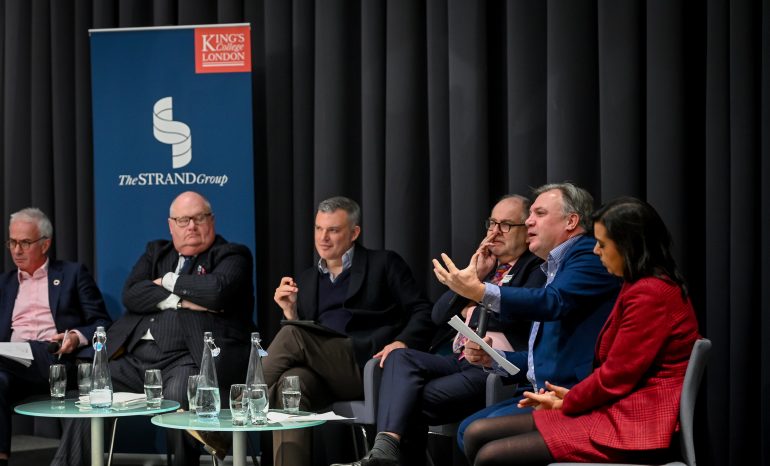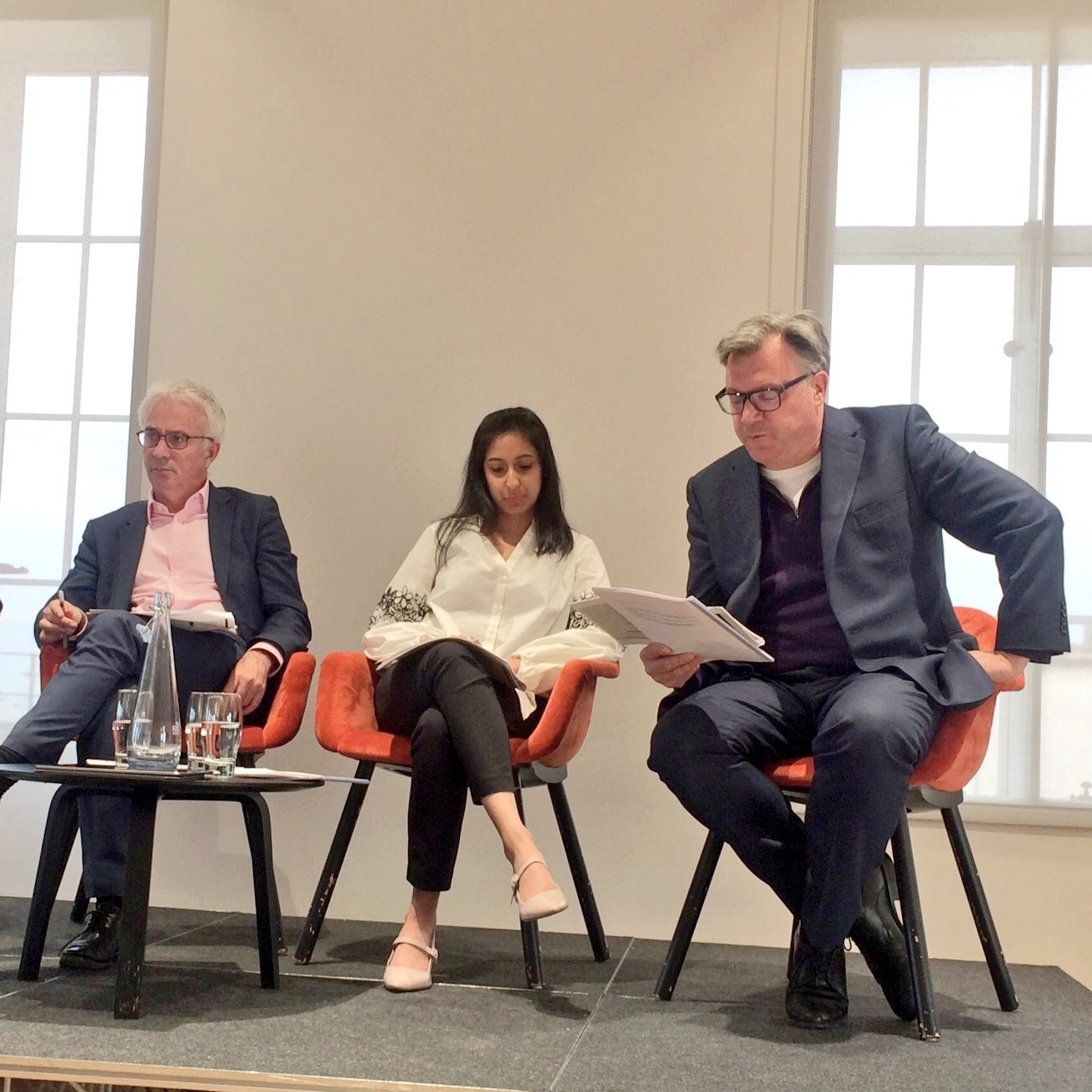BREXIT AND BRITISH BUSINESS
Harvard M-RCBG Paper, ‘Finding 'Global Britain': political slogan to hard economic policy choices, February 2021
The British government has declared that the UK is now entering a new era of ‘Global Britain’. This paper, the latest in the ‘Brexit’ series, considers the challenges and opportunities that the government faces in turning ‘Global Britain’ from a political slogan to an economic policy reality. With the UK at a post-Brexit crossroads, it will now be forced to confront hard choices about its strategic direction. That direction is not only determined by trade, and the UK position on global rules of the game, but also includes migration policy and industrial strategy or the “levelling-up” agenda. These elements must weave into a cohesive Global Britain narrative that works for both domestic and international audiences.
On 23 February, Ed Balls, Nyasha Weinberg, Jessica Redmond, Sechi Kailasa and Tommaso Cariati presented the findings of their paper in a virtual Strand Group seminar. The co-authors were joined for a wider panel discussion on the future of Global Britain by former Cabinet Minister Jo Johnson, Lord Nick Macpherson, former Permanent Secretary to the Treasury, and Shadow Trade Secretary Emily Thornberry MP. You can watch their discussion here.
The paper, co-authored by Ed Balls, Nyasha Weinberg, Jessica Redmond and Simon Borumand, can be read here.
Ed and Jessica also wrote a Times op-ed on 23 February 2021 which can be read here.
Harvard M-RCBG Paper, ‘Will Prioritising a UK-US Free Trade Agreement Make or Break Global Britain?’, May 2020
Talks on a future Free Trade Agreement (“FTA”) between the United Kingdom and United States began on 5 May 2020. This paper, the fifth in a series looking at the impacts of Brexit on the UK economy and trade, examines whether talks might result in an FTA between the US and UK, and what the impact of such a deal could be. Based on interviews with senior government officials, trade and sector experts on both sides of the Atlantic – before and during the Covid-19 Pandemic - we explore the prospects of a deal and what shape that might take.
It concludes that a full FTA with the US before the summer of 2020 is impossible given the impacts of Covid-19 and roadblocks and risks involved. A ‘mini-deal’, however, is a possibility. Yet such a ‘mini-deal’ poses an important strategic dilemma for the Government: will it draw the UK into an emerging US foreign and economic policy based on anti-China bilateralism, closing the door on ‘Global Britain’; or can the UK use this opportunity to help encourage the US back into the global community?
On 12 May, Ed Balls, Nyasha Weinberg and Jessica Redmond presented the findings of their paper in a virtual Strand Group seminar. The co-authors were joined for a wider panel discussion on the potential for a UK-US FTA by Dr Meredith Crowley, Reader in International Economics at Cambridge University, Lord Nick Macpherson, Chair of Hoare’s Bank and former Permanent Secretary to the Treasury, George Osborne, Editor of the Evening Standard and former Chancellor of the Exchequer and Shanker Singham, Academic Fellow IEA and former advisor to both USTR and the UK Trade Secretary.
The paper, co-authored by Ed Balls, Nyasha Weinberg, Jessica Redmond and Simon Borumand, can be read here.
Ed also wrote a Financial Times op-ed on 12 May 2020 discussing the challenges and likelihood of a UK-US FTA, which can be read here.
Harvard Kennedy School Forum: ‘Brexit: What’s Next?’, February 2019
On 11 February, Ed took part in a Forum event, hosted by the Harvard Kennedy School’s Institute of Politics, discussing how Britain got to the point of Brexit and what is likely to happen in the run up to the UK leaving the EU on 29 March 2019 - and beyond.
Ed was joined on the panel by Harriett Cross, British Consul General to New England, and Amanda Sloat, Robert Bosch Senior Fellow, Center on the United States and Europe, Brookings and Fellow, Project on Europe and the Transatlantic Relationship, Belfer Center for Science & International Affairs.
The Forum was moderated by Cathryn Clüver Ashbrook, Executive Director, The Future of Diplomacy Project and Executive Director, The Project on Europe and the Transatlantic Relationship.
Watch the video of the Forum, ‘Brexit: What’s Next?’ here.
Harvard M-RCBG Paper, ‘“Deal or no Deal?’’: Businesses’ Views on the Endgame of the Brexit Negotiations’, December 2018
This paper represents the fourth phase of a research project conducted by the Brexit team at Harvard Kennedy School’s Mossavar Rahmani Center for Business and Government, which examines the impact of Brexit on small and medium-sized British businesses.
In October and November 2018, the team returned to the SMEs that had been consulted over the past two years to get an update on their views on Brexit and the UK Government’s negotiations with the European Union. Most of the businesses have not changed their underlying positions on Brexit: the vast majority of businesses want to remain in the EU, or to see the Brexit negotiations result in a future relationship that facilitates frictionless trade, access to skilled and unskilled labour, and aligned regulation. A majority of respondents would be inclined to support the Government’s proposed Draft Withdrawal Agreement (“DWA”) and Draft Political Declaration (“DPD”) if the only alternative is a “No Deal” scenario. However, many expressed deep concern about the continuing uncertainty created by the Government’s plans - a “Blind Brexit” under which the future UK-EU relationship is negotiated only after the UK has left the EU. Most companies want more detail, less uncertainty, and a greater guarantee of future proximity to the EU than the Government’s proposals offer.
This research is primarily based on 180 interviews with over 120 small and medium-sized businesses, academics and trade association over the past two years, and draws on interviews and research from previous papers.
The paper, co-authored with Peter Sands, Emily Benn, Kevin Ferriter, Tobias Garnett, Eleanor Hallam, Sebastian Leape and Nyasha Weinberg, can be read here.
Harvard M-RCBG Paper, 'On the Rebound: Prospects for a US-UK Free Trade Agreement', May 2018
This paper, the third in a series exploring the impact of Brexit on British businesses, examines the prospects for, and potential impact of, a free trade agreement between the US and the UK. The research is based primarily on interviews with senior government officials, economists and trade experts, plus a range of companies and trade associations from the UK, US, and Europe. It discusses the key potential upsides, possible risks and principal negotiating issues from both US and UK perspectives. It concludes that it is highly unlikely that a free trade deal between the US and the UK will be secured in the near term and that the likely potential benefits for British businesses are less than often suggested. At the launch event, Ed and the team outlined their seven key findings:
Finding 1: UK needs a deal, but it is unclear how committed the US is
Finding 2: There is a clear power imbalance between the US and UK (the relative size of the US and UK economies and the relative institutional experience and capacity in conducting trade negotiations)
Finding 3: The UK must strike a deal with the EU before it can negotiate an FTA with the US
Finding 4: The UK will have little to gain and will have to concede more on tariff reductions than the EU offered in TTIP
Finding 5: The US demands on non-tariff and regulatory issues will be politically contentious and difficult for the UK to meet
Finding 6: Negotiating non-tariff and regulatory issues will force the UK to choose between US or EU in terms of regulatory alignment
Finding 7: The US cannot, or will not, move on many British non-tariff and regulatory interests
The paper concludes that both US and UK officials are doubtful that a meaningful deal can be reached therefore British business should not bank on the prospect of a US-UK Free Trade Agreement. While it might be a great idea, this research suggests such an agreement is not going to happen any time soon, and that any gains will be very hard to realise.
The paper, co-authored with Eleanor Hallam, Sebastian Leape and Nyasha Weinberg, can be read here.
Ed and Peter also wrote a Huffington Post blog post discussing the key findings from the paper.
Harvard M-RCBG Paper, 'Time for Clarity: The Views of British Business on The Path to Brexit', February 2018
This paper represents the second phase of a research project exploring the challenges and opportunities from the perspective of mid-sized British businesses. Based on interviews with over 120 individual businesses, trade associations and experts, this research seeks to identify and discuss the issues and priorities of mid-sized British businesses as the UK progresses towards exiting the European Union. Highlights from this second phase of research include: most businesses want to remain in the Single Market, and if that proves impossible, to stay in the Customs Union; most businesses fear Brexit will result in more regulation, not less; and almost all British businesses want to maintain flexible access to EU labour. The key conclusion from these interviews is unambiguous: most British business leaders are concerned that the current path of Brexit could well cause significant damage to business, both because the end-point will inevitably mean more barriers to trade, most likely more regulation, and almost certainly less influence; and because the process of leaving the EU is creating huge uncertainties and diverting management efforts.
The paper, co-authored with Peter Sands, Eleanor Hallam, Sebastian Leape, Mehek Sethi and Nyasha Weinberg, can be read here.
Harvard M-RCBG Paper,'Making Brexit work for British Business: Key Execution Priorities', June 2017
Brexit implies profound changes for British businesses: from how they trade, to how they are regulated and how they employ people. To explore the challenges and opportunities, Ed and the Harvard team interviewed over 50 mid-sized British businesses and trade associations, with the objective of identifying the key execution priorities for Brexit from their perspective. The paper sets out the findings from the interviews and draws conclusions for policymakers. Key themes emerging include: the overwhelming importance of securing a good trade deal with the EU; the concern that Brexit would lead to an increased regulatory burden not a reduction; the need for continued engagement with EU regulatory agencies; the fact that Brexit will necessarily trigger a fundamental rethink of policy towards some sectors, in particular agriculture; and the need to upgrade customs control procedures and revamp the immigration system.
The paper, co-authored with Peter Sands, Sebastian Leape and Nyasha Weinberg, can be read here.







